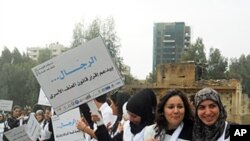Hundreds of people stood shoulder to shoulder in Beirut Friday, demonstrating their support for a women's rights campaign that has swept the city for the past few weeks.
It's called a human chain, and activists say it visually represents their cause: Men and women standing together against domestic violence. Most of the 200 people lining the streets of Beirut are wearing white banners, or white scarves saying, "Be a real man: United in ending violence against women."
Anthony Keedi, one of the organizers, says that the ribbons are a part of a worldwide campaign designed to get men to speak out against domestic violence. And, although White Ribbon Campaigns, have been going on around the world for many years, this is the first time it has been introduced in the Middle East. He says Lebanese men often support the cause once they understand it to be a human rights issue, rather than exclusively a women's issue.
"They realize that, yeah, they might have stood for this all along," said Keedi. "They just haven't spoken about it. And now they're realizing that it is their job. It's a sense of ownership. It is my obligation to speak about it because these are my principles."
This demonstration was one of many in Beirut over the past two weeks and part of a global campaign against domestic violence called: "16 Days of Activism Against Violence Against Women." In Beirut, the campaign also included the presentation of a pilot study by activist organizations, Kafa (Enough) Violence and Exploitation and Oxfam.
The study indicates that most men in Lebanon grow up as either witnesses or victims of violence and that domestic violence is found equally in Lebanese families, regardless of socio-economic status or religion. It also shows that Lebanese men generally define violence only in terms of beatings or rape- not psychological or verbal abuse. And the men in Lebanon are, as one activist put it, bombarded with norms of masculinity.
Kafa has also focused the local anti-domestic violence campaign on gathering support for a change in the Lebanese law. Currently, there are no laws in Lebanon designed to protect women from violence inside their homes. If adopted by Parliament, activists say the law will protect women by allowing them to report abuses confidentially, seek protection orders against their husbands, and create private family courts. During the campaign, organizers passed out a petition supporting the law that now, after two years of campaigning, has about 10,000 signatures.
Activist Marita Kassis says that although many governments in the Middle East, like Lebanon, have signed international human rights agreements, treaties have done little for the women here. She says women in Lebanon need new local laws, and to change the way society views violence against women.
Lebanon Activists Stand Against Domestic Violence





